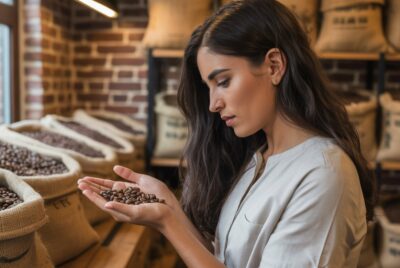Carbs in Coffee: Complete Guide for Health-Conscious Drinkers
*We may earn a commission for purchases made using our links. Please see our disclosure to learn more.
Coffee is one of the world’s most popular beverages, consumed by billions of people daily. However, many coffee drinkers remain unaware of the carbohydrate content in their daily cup, which can significantly impact their health goals and dietary plans.
Understanding carbs in coffee becomes crucial for individuals following specific dietary approaches such as ketogenic diets, managing diabetes, or tracking macronutrients for fitness objectives. The carbohydrate content can vary dramatically depending on how coffee is prepared and what ingredients are added.
While plain black coffee contains minimal carbohydrates—less than 1 gram per 8-ounce serving—the addition of milk, sugar, syrups, and other popular coffee enhancers can transform a virtually carb-free beverage into a high-carbohydrate drink. This comprehensive guide explores everything you need to know about carbs in coffee, helping you make informed decisions that align with your nutritional goals without compromising your coffee enjoyment.
“Coffee is a language in itself. Understanding its nutritional profile is like learning to speak fluently in the dialect of health-conscious living.”
– Nutritional Science Journal
Key Takeaways
- Black coffee is virtually carb-free: Plain brewed coffee contains less than 1 gram of carbohydrates per 8-ounce cup
- Additives change everything: Milk, sugar, syrups, and creamers can add 5-50+ grams of carbs per serving
- Coffee shop drinks are carb bombs: Popular specialty drinks can contain 30-80 grams of carbohydrates
- Keto-friendly options exist: Sugar-free syrups, heavy cream, and MCT oil can keep your coffee low-carb
- Read labels carefully: Different coffee products and additives vary significantly in carb content
The Science Behind Coffee and Carbohydrates
Understanding carbohydrates in coffee begins with examining the coffee bean itself. Coffee beans are seeds from the coffee cherry, and like most plant-based foods, they contain small amounts of carbohydrates. However, the brewing process extracts primarily the soluble compounds—mainly caffeine, antioxidants, and aromatic compounds—while leaving most of the carbohydrate content behind in the grounds.
Research shows that an 8-ounce cup of black coffee contains approximately 0.7 grams of carbohydrates. This minimal amount comes from trace sugars and fiber compounds that dissolve during the brewing process. For practical purposes, this amount is negligible and won’t significantly impact blood sugar levels or ketosis for most individuals.
The brewing method can slightly influence carbohydrate content. Espresso, due to its concentrated nature, contains about 0.5 grams of carbs per 1-ounce shot. Cold brew coffee, which involves longer steeping times, may extract slightly more carbohydrates, but the difference remains minimal—typically less than 1 gram per serving.
Where Coffee Gets Complicated: The Additive Factor
The carbohydrate story changes dramatically when you start customizing your coffee. Each addition brings its own nutritional profile, and these can quickly accumulate:
- Milk and Cream Variations: Whole milk contains approximately 12 grams of carbohydrates per cup, primarily from lactose. A typical coffee serving uses 1-2 ounces of milk, adding 1.5-3 grams of carbs. Half-and-half contains about 1 gram of carbs per ounce, while heavy cream contains less than 1 gram per ounce, making it the preferred choice for low-carb dieters.
- Sugar and Sweeteners: Regular sugar packs 4 grams of carbohydrates per teaspoon. Many coffee drinkers use 2-3 teaspoons, immediately adding 8-12 grams of carbs to their morning cup. Brown sugar, honey, and agave nectar contain similar or higher carbohydrate amounts.
- Flavored Syrups and Seasonal Additions: Commercial coffee syrups typically contain 15-20 grams of carbohydrates per pump. Popular drinks like pumpkin spice lattes or caramel macchiatos can easily exceed 40-50 grams of carbs per serving when made with regular syrups and milk.
The Coffee Shop Challenge
Navigating carbohydrates becomes exponentially more challenging when ordering from coffee shops. Many popular drinks are essentially desserts disguised as morning beverages:
A medium caramel frappuccino can contain over 60 grams of carbohydrates—more than some people consume in an entire meal. Even seemingly healthier options like chai lattes or matcha drinks often contain 25-35 grams of carbs due to added sugars and milk.
The portion sizes at coffee shops compound this issue. What’s marketed as a “medium” or “grande” often contains 12-16 ounces of liquid, compared to the standard 8-ounce cup used in nutritional calculations. This means you could be consuming 1.5-2 times the carbohydrates you think you are.
Strategies for Low-Carb Coffee Success
Creating a satisfying, low-carb coffee routine requires strategic thinking and sometimes creative substitutions. The goal isn’t to eliminate enjoyment but to make informed choices that align with your health objectives.
- Master the Art of Black Coffee: Developing an appreciation for black coffee opens up endless possibilities. Start by choosing high-quality, freshly roasted beans. Single-origin coffees often have distinct flavor profiles that can be as complex and satisfying as any flavored drink. Experiment with different brewing methods—pour-over, French press, and cold brew each extract different flavor compounds.
- Smart Substitution Strategies: When you crave creamy coffee, heavy cream provides richness without significant carbs. For sweetness without sugar, natural options like stevia, monk fruit, or erythritol can satisfy your sweet tooth without impacting blood sugar. Sugar-free syrups have improved dramatically in recent years, offering genuine flavor without the carbohydrate load.
- Timing and Portioning: If you choose to include some carbohydrates in your coffee, timing matters. Consuming them around workout times can help your body utilize the glucose more effectively. Additionally, measuring your additives rather than eyeballing them helps maintain consistency in your carb intake.
The Metabolic Impact of Coffee Carbohydrates
Understanding how different types of carbohydrates in coffee affect your metabolism can help you make better choices. Simple sugars from regular table sugar or corn syrup cause rapid blood sugar spikes, followed by crashes that can leave you feeling tired and craving more sugar within hours.
Lactose from dairy products is absorbed more slowly than simple sugars, providing a gentler impact on blood glucose levels. However, some individuals have lactose intolerance, which can cause digestive issues regardless of the carbohydrate impact.
For those following ketogenic diets, even small amounts of carbohydrates can be significant. The goal of ketosis is to keep daily carb intake below 20-50 grams, depending on individual factors. A single high-carb coffee drink could consume half or more of this daily allowance.
Building Your Perfect Low-Carb Coffee Routine
Creating a sustainable, low-carb coffee routine requires experimentation and patience. Start by gradually reducing the amount of high-carb additives you use. If you typically add two sugars, try reducing to one for a week, then half, then none. Your taste buds will adapt more easily with gradual changes.
Invest in quality coffee equipment and beans. Better coffee tastes good on its own, reducing the need for flavor-masking additives. A good grinder, proper water temperature, and fresh beans can transform your coffee experience without adding any carbohydrates.
Consider the psychological aspects of your coffee routine. If coffee represents a moment of comfort or ritual in your day, focus on preserving those elements while modifying the nutritional content. Perhaps it’s the warmth of the mug in your hands, the aroma, or the quiet moment before your day begins—these experiences don’t require carbohydrates.
Special Considerations for Different Dietary Approaches
- Ketogenic Dieters: For those following strict ketogenic diets, coffee can actually become a vehicle for increasing healthy fat intake. Bulletproof coffee, made with MCT oil or butter, provides sustained energy without carbohydrates. However, be mindful of calories—fats are calorie-dense, and it’s possible to overconsume even on a keto diet.
- Diabetics: Individuals managing diabetes need to be particularly careful about coffee additives. Even sugar-free options can affect blood glucose in some people. Monitor your blood sugar response to different coffee preparations to understand your personal reactions.
- Athletes and Active Individuals: For those with higher activity levels, strategic carbohydrate intake around workouts can be beneficial. Having a small amount of carbs in your pre-workout coffee might actually enhance performance and recovery.
The Hidden Sources of Coffee Carbohydrates
Beyond the obvious additives, several hidden sources of carbohydrates can sneak into your coffee routine:
- Flavored Coffee Beans: Some flavored coffees have sugar or artificial flavoring compounds added during the roasting process. While the amounts are typically small, they can add up for frequent consumers.
- Instant Coffee Products: Many instant coffee mixes contain added sugars, creamers, and flavorings. A single packet of flavored instant coffee can contain 8-15 grams of carbohydrates.
- Coffee Creamers: Non-dairy creamers often contain corn syrup, sugar, or other carbohydrate sources. Even “sugar-free” versions may contain small amounts of carbs from thickening agents and flavor enhancers.
Long-Term Success and Lifestyle Integration
Maintaining a low-carb coffee routine isn’t just about the immediate nutritional impact—it’s about creating sustainable habits that support your long-term health goals. This means finding approaches that you can maintain consistently without feeling deprived or restricted.
Consider the social aspects of coffee consumption. If coffee dates or office coffee breaks are important parts of your social life, develop strategies for navigating these situations while maintaining your dietary goals. Most coffee shops now offer sugar-free syrups, alternative milks, and other low-carb options.
Track your progress and how different coffee choices make you feel. Some people notice improved energy levels, better appetite control, or enhanced mental clarity when they reduce carbohydrates in their coffee routine. These positive reinforcements can help maintain motivation for long-term success.
Conclusion
Understanding carbohydrates in coffee empowers you to make informed decisions that align with your health goals without sacrificing one of life’s simple pleasures. While black coffee is virtually carb-free, the additions and modifications we make can significantly impact our daily carbohydrate intake.
The key to success lies in awareness, experimentation, and finding sustainable approaches that work for your lifestyle. Whether you’re following a strict ketogenic diet, managing diabetes, or simply trying to make healthier choices, there are strategies and products available to help you enjoy great-tasting coffee while maintaining your nutritional goals.
Remember that small changes can have significant cumulative effects. Reducing the sugar in your daily coffee by just one teaspoon saves over 1,400 grams of carbohydrates per year, equivalent to removing several pounds of sugar from your annual diet.
Your coffee routine doesn’t have to be complicated or restrictive. With the right knowledge, tools, and mindset, you can create a morning ritual that supports both your health goals and your love for this beloved beverage.
Frequently Asked Questions
Q: Does black coffee really have zero carbs?
A: Black coffee contains approximately 0.7 grams of carbohydrates per 8-ounce cup, which is considered negligible for most dietary purposes. This small amount comes from naturally occurring compounds in the coffee beans and won’t significantly impact blood sugar or ketosis.
Q: Which milk alternative has the lowest carbs for coffee?
A: Unsweetened almond milk contains the lowest carbohydrates among plant-based alternatives, with only 1-2 grams per cup. Heavy cream has even fewer carbs (less than 1 gram per ounce) but is higher in calories and fat.
Q: Can I drink coffee on a keto diet?
A: Yes, black coffee is perfectly compatible with ketogenic diets. You can enhance it with high-fat, low-carb additions like heavy cream, MCT oil, or butter. Avoid sugar, regular milk, and flavored syrups that contain carbohydrates.
Q: How many carbs are in popular coffee shop drinks?
A: Specialty coffee drinks can contain 30-80 grams of carbohydrates depending on size and ingredients. A medium caramel macchiato contains about 35 grams, while a large frappuccino can exceed 70 grams of carbs.
Q: Do artificial sweeteners in coffee affect blood sugar?
A: Most artificial sweeteners don’t significantly impact blood glucose levels, but individual responses can vary. Some people experience slight blood sugar changes with certain sweeteners like maltitol or sucralose. Monitor your personal response to determine what works best for you.




